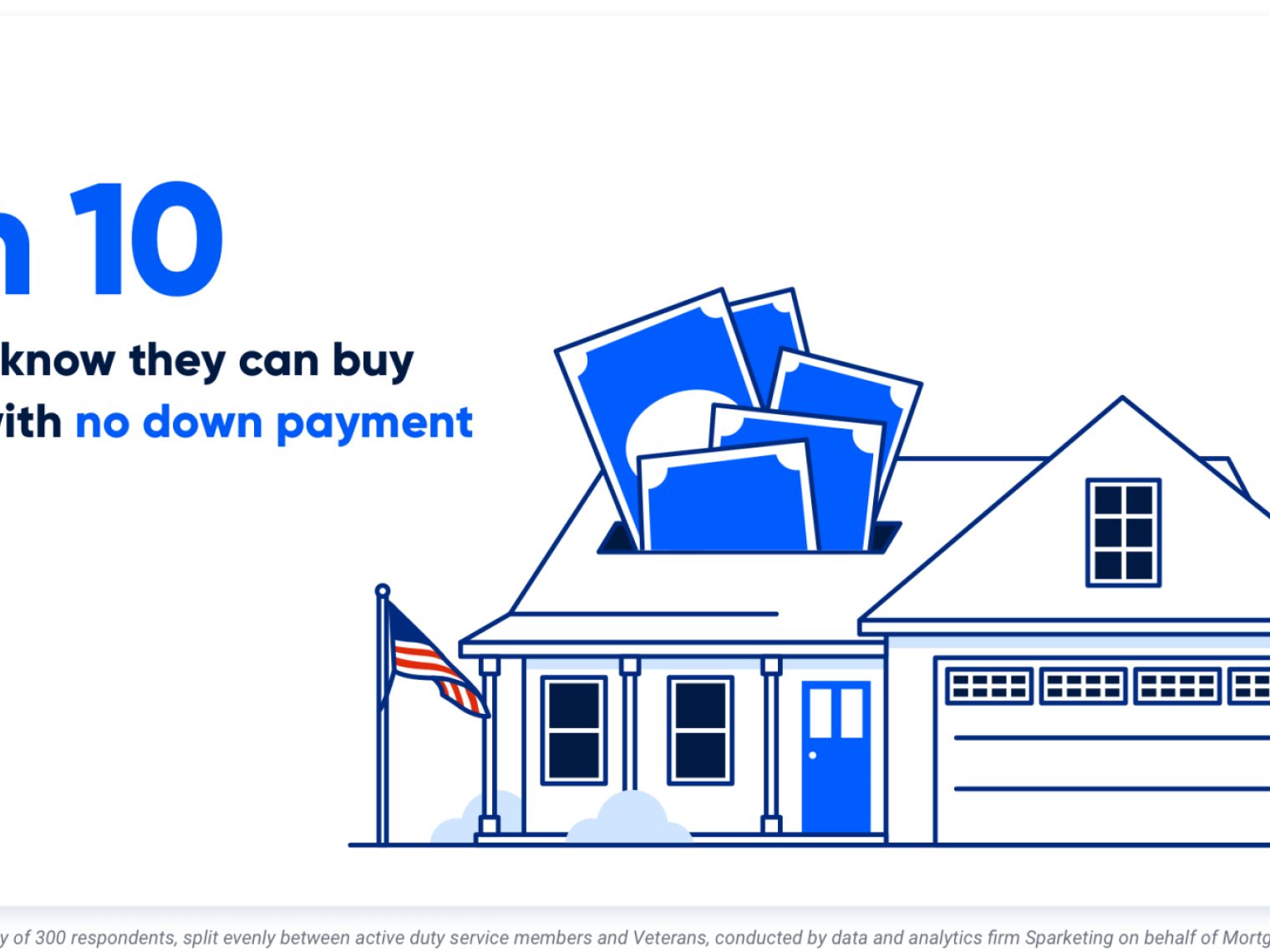For service members, deciding whether to buy a house can be incredibly challenging. On one hand, becoming a homeowner is a dream for many and ensures long-term security for you and your family. On the other hand, owning a home is a sizable commitment and can pose logistical challenges if you receive Permanent Change of Station (PCS) orders.
With proper planning, the benefits of homeownership far outweigh the hurdles, especially if you're eligible for a VA loan. Here are five reasons why buying a house in the military is better than renting.
1. VA Loans Make Buying a Home in the Military Easier
If you're already eligible to take advantage of your VA loan benefits, doing so can make buying a home even easier.
VA loans often require no down payment, allowing military members and Veterans to become homeowners without the hefty upfront costs typically associated with home purchases. VA loans also have more lenient credit score requirements than conventional mortgages and do not require private mortgage insurance (PMI) like other mortgage loan types.
When eligible military members choose to rent, they cannot enjoy these perks offered by the VA. VA loan benefits are a well-earned reward for your service to your country, so try to take advantage of them.
2. VA Loan Borrowers Have PCS Protections
As an active duty service member considering a home purchase, a PCS order may be your biggest barrier. The good thing is that VA loan borrowers enjoy several protections that prevent any consequences from loan prepayment penalties or occupancy requirements.
Typically, loan prepayment penalties are fees charged to borrowers if they pay off the loan before the specified term. However, VA loans have no prepayment penalties. This means borrowers can pay off their mortgages early or make extra payments without any additional fees. As long as you repay the principal value of your loan and the accrued interest, you will avoid any consequences and fully restore your VA loan entitlement.
Another hurdle is that VA loan borrowers must meet occupancy requirements. Typically, this means you must move into the home within 60 days of a predetermined date and physically live in the home as your primary residence for at least 12 months. However, if you receive a PCS order and you're married, your spouse can meet these requirements for you. Single service members or those who otherwise live alone may receive an exemption if they had "valid intent" to live in the home before they were relocated.
Don't avoid buying a home due to the possibility of a PCS order. You can discuss your situation with a Veterans United VA loan expert anytime.
3. Renting Will Only Get More Expensive
One of the most significant advantages of buying a house in the military is the potential for long-term savings. While renting may initially seem cheaper, rental prices tend to increase year-to-year due to inflation and rising demand. Meanwhile, monthly mortgage and interest payments stay the same as long as you make them on time in their full amounts.
Let’s break this down further with an example. The table below outlines how monthly rent payments compare to monthly mortgage payments over time.
Monthly Rent Payment vs. Mortgage Payment Over Time
| Years | Monthly Rent Payment | Monthly Mortgage Payment | Monthly Difference | Yearly Difference |
|---|---|---|---|---|
| 1 | $1,200 | $1,500 | -$300 | -$3,600 |
| 2 | $1,260 | $1,500 | -$240 | -$2,880 |
| 3 | $1,323 | $1,500 | -$177 | -$2,124 |
| 4 | $1,389 | $1,500 | -$111 | -$1,332 |
| 5 | $1,458 | $1,500 | -$42 | -$504 |
| 6 | $1,531 | $1,500 | +$31 | +$372 |
| 7 | $1,607 | $1,500 | +$107 | +$1,284 |
As a renter, you will likely continue to pay increasing amounts for housing. While homeownership may have a more significant initial cost, it is a wiser investment that can save you money in the future.
4. Homeownership Improves Your Credit and Equity
If you choose to rent instead of buy, you will lose a chance to improve two critical financial factors: your credit score and equity.
Buying a home can boost your credit score over time since it is an indicator that you're good at managing your money. Paying your mortgage on time and as agreed shows lenders and credit bureaus that you're a reliable borrower. This helps build a positive track record on your credit report.
Equity is the difference between the value of your home and the amount you owe on your mortgage. Your equity will increase as you make mortgage payments and your property appreciates. Accrued equity can eventually be cashed out and used for various financial needs, such as funding education, starting a business or covering unexpected expenses.
Renting doesn’t allow for the credit and equity-building opportunities inherent to owning a home. Paying rent typically doesn't boost your credit score because rent payments are not regularly reported to credit bureaus unless you use a specific rent-reporting service. Renters also do not build equity since they are essentially paying someone else for the right to live in their property without acquiring ownership.
The further in life you go, the more critical having good credit and high equity becomes. Buying a house in the military is a great way to start building these foundational financial benchmarks.
5. Owning a Home Provides Freedom
Buying a home in the military gives you control over your living space and the ability to make modifications or improvements to suit your needs and preferences. You can personalize your home, whether it's through renovations, landscaping or decorating.
The power of personalization is good for more than just customization; having the freedom to upgrade your home and add additions can drastically increase its value. Eligible service members may also purchase a home and receive funds to repair it with a VA renovation loan. This level of control and decision-making is not typically available when renting, meaning you lose out on the opportunity to boost the value of your home.
Is it Worth Buying a House in the Military?
In the long term, the security and stability of owning a home far surpass the temporary flexibility that renting offers. Homeownership can improve your credit score and home equity, giving you more financial leverage in the future. The ability to customize your property gives you the opportunity to improve its value and contributes to your peace of mind.
If you're ready to explore your options, you can speak with a Veterans United VA loan expert anytime at 855-870-8845.
Answer a few questions below to speak with a specialist about what your military service has earned you.
Related Posts
-
 VA Loan Down Payment RequirementsVA loans have no down payment requirements as long as the Veteran has full entitlement, but only 3-in-10 Veterans know they can buy a home loan with zero down payment. Here’s what Veterans need to know about VA loan down payment requirements.
VA Loan Down Payment RequirementsVA loans have no down payment requirements as long as the Veteran has full entitlement, but only 3-in-10 Veterans know they can buy a home loan with zero down payment. Here’s what Veterans need to know about VA loan down payment requirements. -
 5 Most Common VA Loan Myths BustedVA loan myths confuse and deter many VA loan borrowers. Here we debunk 5 of the most common VA loan myths so that you can borrow with confidence.
5 Most Common VA Loan Myths BustedVA loan myths confuse and deter many VA loan borrowers. Here we debunk 5 of the most common VA loan myths so that you can borrow with confidence.


